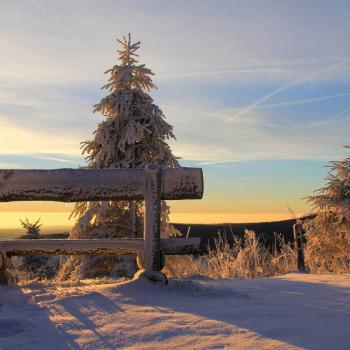The Adventurous Lectionary – The Third Sunday after Pentecost – June 18, 2023
Genesis 18:1-15, Psalm 116:1-2, 12-19, Romans 5:1-8, Matthew 9:35-10:8
Taken together, this Sunday’s readings paint a portrait of a holistic faith involving the interplay of hospitality, healing, and mission, whether we are in ordinary time, living with the challenge of post-pandemic congregational life, or in the middle of protesting injustice. Without having to invoke supernatural causation, they ask us and our congregations to expect surprises when we align ourselves with God’s vision for our lives. God’s energy and power move through all creation, however, when we are awakened to God’s presence, quantum leaps of energy, reflections of the energy of love, burst forth transforming our lives and the world. We can expect great things from God, and great things from ourselves. The natural world within which God works is more amazing than we can imagine.
Although the story of Abraham and Sarah is the stuff of legends, and may not be factual, it may also contain the deeper truths of divine fidelity and the impact of faith on body, mind, spirit, and relationships. In the encounter of Abraham and Sarah with three divine messengers, and perhaps the divine itself, hospitality leads to unexpected new life. Abraham and Sarah are childless, having given hope of God’s promise that they will be a parent of a great nation. God appears to them in the guise of three visitors. Are these the three persons of the Holy Trinity? Are they angelic emissaries?
Regardless of their identity, Abraham and Sarah set the table for them, and treat these strangers as honored guests. Out of that strange encounter comes an amazing forecast, Sarah, long past menopause, will give birth to a child. She is appropriately amazed and scandalized by the thought. Yet, God’s promises are sure and certain, and within the year, Abraham and Sarah are parents of the future patriarch Isaac.
Remember the Emmaus story. When two pilgrims welcome a stranger for dinner, they experience the Risen Jesus in the breaking of the break. Hospitality, treating others as Christ, as Divine, awakens transformative energy.
New life bursting forth from hospitality. Meeting angels unawares, as the Epistle of Hebrews counsels. When we entertain unexpected guests, our personal and congregational lives are transformed. Moribund churches experience the breath of new life. Angels are everywhere, disguised as our human – and dare we say, non-human – companions. As we have done to the least of these, the do unto Christ. The encounter of Abraham and Sarah invites us to consider the questions:
What outsiders do we need to welcome in our congregations? What acts of hospitality will transform our congregation, giving it new life, when the future seemed dim? How do we appropriately go beyond our comfort zones to respond with hospitality and love? How will our hospitality lead to new birth in our lives and congregations?
Psalm 116 continues the spirit of hospitality, asking “what gift can I return to God for all the blessings I’ve experienced?” Gratitude leads to mission and service. Abraham and Sarah welcomed the divine and were blessed. Perhaps they remembered the kindnesses they had experienced as strangers. Their hospitality was simply saying “thank you” for the gifts they’d received over the years. Giving a stranger supper leads to a resurrection experience. We, too, need to ask that question. We, who are blessed, need to bless God and bless others. Loving others and God fit together. We love Creator when we love God’s creatures. Our generosity, I believe, enriches God’s experiences and enables God to be active in the world. By doing something beautiful for God, we contribute to God’s reign of beauty, and injects new and creative energies into the universe.
God is not aloof and distant, unaffected by the world. God is the most moved mover, who receives every good gifts and uses our gifts as part of God’s redemptive activity. (For more on this vision of a relational God, see Bruce Epperly, “Process Theology: Embracing Adventure with God,” “Process Theology: A Guide for the Perplexed,” and “Taking a Walk with Whitehead: Meditations on Process-Relational Theology.)
Our return from our bounty must involve playing our part in healing the world. When we love the world, we love God. When bless others, we bless God. We love the Creator by loving God’s creatures.
Romans 5 describes God’s amazing grace. God gives us grace regardless of our status: God loves us and there’s nothing we can do about it. While we were yet sinners, God sacrificed for our well-being. Salvation is not something we earn, but a gift we receive. God loves us before we can earn God’s love or even have heard the name “God.” For Paul, grace is amazing, and far more than we ever deserve, and all we can do is say “yes” and let it flow from us to others. The experience of grace enables us to face the challenges of life, and even difficult situations, knowing that we are in God’s hands, and nothing in death and life can separate us from the love of God. As channels of grace, we must see God’s grace coming to Trump and Biden, sinner and saint, and friend and enemy.
In the Gospel reading, Matthew portrays Jesus as a healer and preacher who commissions his followers to the same vocation. The twelve are to be Jesus’ emissaries of grace, first to the Jewish people. The initial exclusion of the Samaritans and Gentiles may not be a concession to racism or xenophobia, but a charge to begin where we are. The message of the gospel will eventually go global, but it must start with people who will be initially most receptive and to whom the first followers of Jesus can share their message.
While the world is our parish, as Wesley says, most congregations need to start mission and outreach programs where they are, in their neighborhoods and among their peers, both socially and geographically, along with raising their consciousness about global issues.
This passage asks: Do we know who our neighbors are? Are we ministering in our neighborhood or do we isolate ourselves from our most immediate neighbors? Do we take advantage of the culture in which we live in finding common ground for our message of creative transformation and healing? While we should not restrict our mission to “people like us,” we also need address the needs of those with whom we have much in common. While we must address injustice toward the descendants of slaves, we must also care for victims of injustice and poverty in the white community. While we respond to the challenges of urban schools, we must also recognize the challenges of neglected children in suburban communities.
The first followers of Jesus are given a “great” commission, in fact, tasks well beyond their – and our – abilities, left to our own devices, to restore life, to cure the sick, to challenge the demonic, and to share good news of God’s presence. The calling of the gospel may well beyond our abilities, but when we reach out, we should expect to claim our place as God’s healers, teachers, guides, and justice-seekers. We are always asked to do more than we think we can do, but God gives us the energy to do great things. We are not alone. We are not without resources; the whole energy of the universe is behind us. The moral and spiritual arcs support us. God is with us.
This Sunday’s readings awaken us to the life-transforming power of hospitality and faith. When we welcome God’s messengers into our lives, grace will abound, people will be healed, and congregations will flourish.
+++
Bruce Epperly is a pastor, professor, spiritual guide, and author of over seventy books, including THE ELEPHANT IS RUNNING: PROCESS AND OPEN AND RELATIONAL THEOLOGY AND RELIGIOUS PLURALISM; PROPHETIC HEALING: HOWARD THURMAN’S VISION OF CONTEMPLATIVE ACTIVISM; MYSTIC’S IN ACTION: TWELVE SAINTS FOR TODAY; WALKING WITH SAINT FRANCIS: FROM PRIVILEGE TO ACTIVISM; MESSY INCARNATION: MEDITATIONS ON PROCESS CHRISTOLOGY, FROM COSMOS TO CRADLE: MEDITATIONS ON THE INCARNATION, and THE PROPHET AMOS SPEAKS TO AMERICA. His most recent books are PROCESS THEOLOGY AND THE REVIVAL WE NEED and TAKING A WALK WITH WHITEHEAD: MEDITATIONS WITH PROCESS-RELATIONAL THEOLOGY. He is currently serving as Bridge Minister at Westmoreland Congregational United Church of Christ in Bethesda, MD, and can be reached at [email protected].













